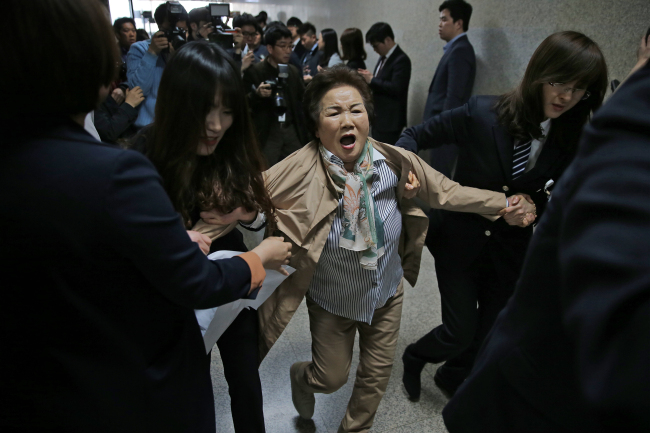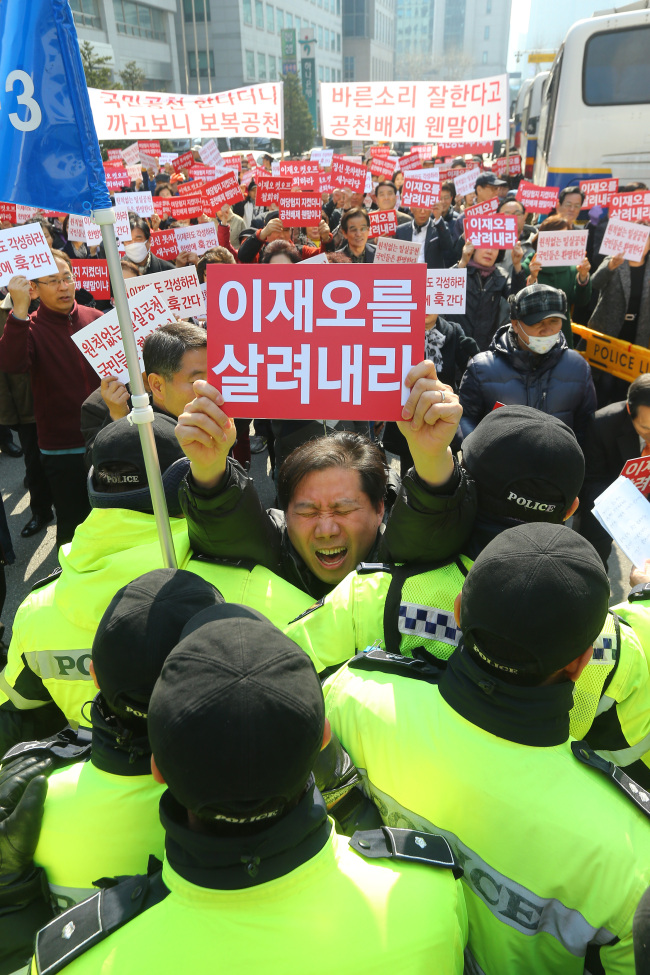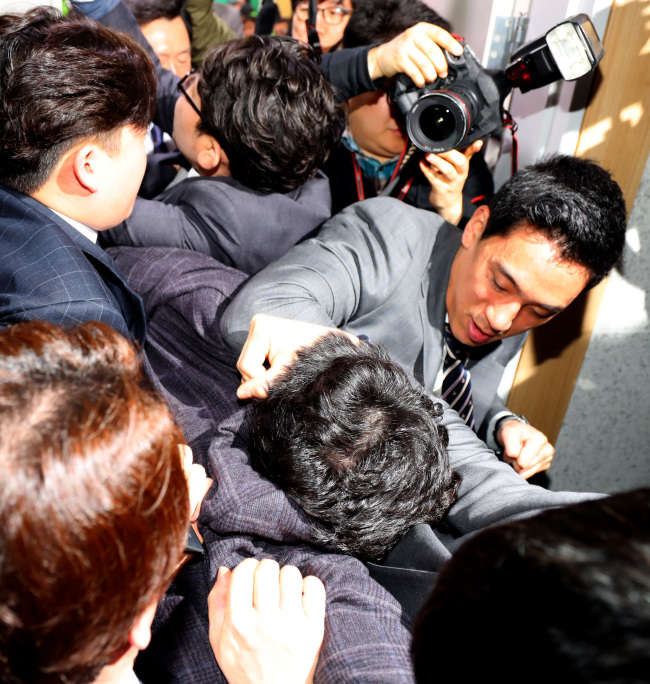Decades of regionalism seem to have left South Korean voters with a certain political inertia — one in which they continue to vote for a specific favored party, regardless of its policies or the candidate.
It is this voter allegiance that often gives political parties the confidence, as well as the discretion, to freely move their candidates from one constituency to another, without sweating over its impact at the ballot box.
But such arbitrary reallocation, though considered a useful deployment strategy in elections, may also backfire on the parties and candidates, should voters disapprove.
|
|
|
Supporters of the Saenuri Party’s Rep. Lee Jae-oh protest the party’s decision to drop his nomination in Seoul on March 16. (Yonhap) |
A recent example is the ruling conservative Saenuri Party’s incumbent fifth-termer Rep. Hwang Woo-yea, who shifted his affiliation to a new neighboring constituency after failing to receive the party’s nomination for his current district.
“Based on my experience of boosting the international city of Songdo, I will now work on developing the northwestern belt so as to create an economically powerful Incheon,” Hwang said.
The lawmaker was granted candidacy in the Seo-gu-B constituency in Incheon last week, after being shoved out of his current Yeonsu-gu constituency, located just south of Seo-gu.
The former deputy prime minister and minister of education had lost favor for his lukewarm support of state-authored history textbooks, a project strongly propelled by the party leadership and President Park Geun-hye. But by volunteering to run in the challenging new constituency, which is considered an opposition stronghold, he made his way back onto the candidate list.
The Saenuri Party has also been blamed for designating former presidential officials to advantageous constituencies, regardless of their regional affiliation or the local voter sentiment.
The exception was Cho Yoon-sun, a former gender equality minister and presidential secretary for state affairs, who declined to be sent to another constituency after losing the regional primary in her current Seocho-A constituency.
 |
| A party member of The Minjoo Party of Korea is blocked while trying to enter the party chairman’s office to protest Kim Chong-in’s nomination on March 21. (Yonhap) |
The main opposition party, too, is prone to shuffling candidates.
Ever since it cut off popular activist figure Rep. Jung Cheong-rae and nominated the party’s chief publicist Sohn Hye-won to his Mapo-B constituency in Seoul, The Minjoo Party of Korea has been swamped with protests by Jung’s supporters and some local voters.
The protests died down once Jung pledged his support for Sohn, but complaints persisted on the party’s centralized nomination process.
|
|
|
Supporters of members who have been omitted from the People’s Party nominations clash with party officials at the National Assembly on March 21. (Yonhap) |
Both rival parties also came under fire over their lists of proportional representation candidates, which in voters‘ eyes have turned into a fraternal list of who to share the next parliamentary seats with, rather than choosing candidates that represent the party’s main policy directions.
The Saenuri Party’s list, for instance, includes controversial figures such as the former chief of the state-run railroad company KORAIL, who was accused of responding excessively to a strike by employees at what they called a move toward privatization. The list also includes President Park Geun-hye’s former aides at Cheong Wa Dae.
The proportional candidate list of the Minjoo Party is no less controversial, the latest point being the disputed nomination of interim chief Kim Chong-in as No. 2 on the party list. The spot — the highest available for a male candidate — has usually been taken by a figure representing politically marginalized people.
Political observers noted that parties may at some point lose sympathy with the public, should they neglect the voter sentiment.
“In this year’s elections, parties are marked for their electoral engineering strategies, meaning that they will take any unconventional and controversial actions, if only to win,” said Choi Chang-ryul, professor at Yongin University.
“The average voter may find such moves confusing and eventually disapprove of the party or the candidate.”
Shin Yul, a political professor at Myongji University, was more critical of the constituency carousel.
“Even veteran politicians are too preoccupied with the turf wars,” he said.
“It seems that politics is no longer about noble visions of serving the people and improving the nation, but just a profitable vocation.”
By Bae Hyun-jung (tellme@heraldcorp.com)
South Korea will elect new National Assembly members in a general election on April 13. The Korea Herald is publishing a series of articles on the candidates’ agendas, election trends and notable runners leading up to the race. This is the eighth installment. — Ed



